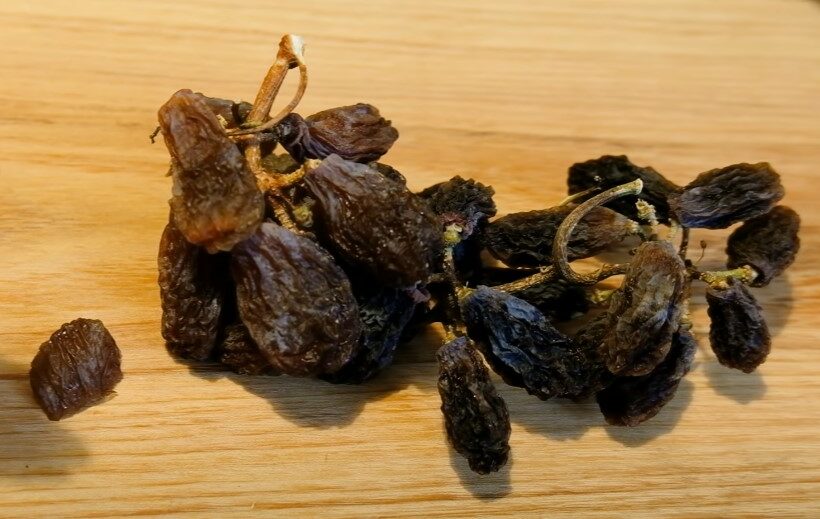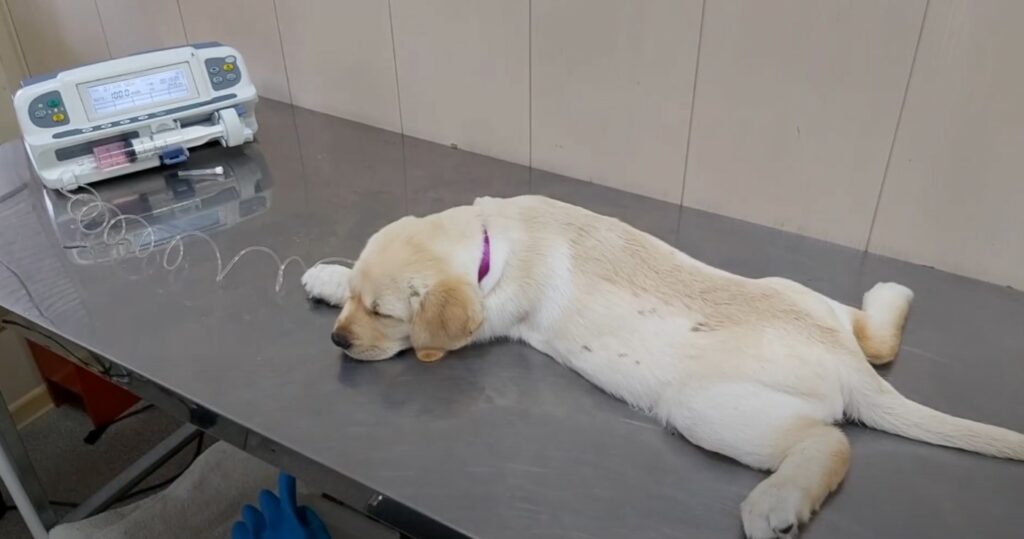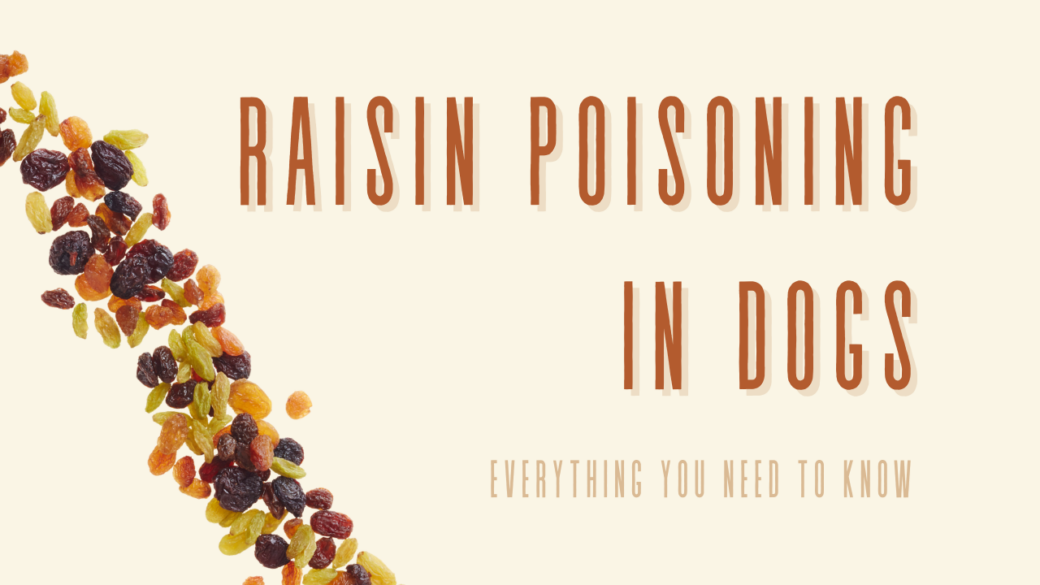Dogs get into everything, and this can cause a lot of stress, especially when it’s impossible to monitor their every move. A lot of things they stick their snouts in are generally safe, but there are some foods and products that can be toxic; raisins, which are a type of dried grapes, are one such food.
When a dog eats grapes or raisins, it can potentially have harmful effects. Not all dogs will suffer from grape or raisin poisoning, but it is better to be safe than sorry. To ensure dog owners are informed on this topic, Household Pets has compiled all of the essential information relating to raisin poisoning in dogs.
Table of Contents
What is Raisin Poisoning?
Grapes, raisins, currants, and sultanas can cause dogs to experience gut and kidney issues. It is believed that dried fruits of the “Vitis vinifera” family, including raisins, are slightly more toxic to dogs than grapes as the poisons are condensed.

The grape and raisin toxicity can also vary from one dog to the next, which means dogs can react differently after eating grapes and raisins. Some dogs might be unaffected, while others can develop life-threatening symptoms.
Why are Raisins Bad for Dogs?
There is no known reason why raisins are bad for dogs, although there are multiple theories. The toxic substance found in raisins is unknown at this time; it’s possible that the flavonoids, monosaccharides, and tannins in the fruit are the main reasons for raisin toxicity. It could also be the tartaric acid that causes raisin and grape toxicity. Research is ongoing to determine why raisins and other fruits are toxic to dogs.
Although raisins are safe for other types of pets to eat, like hamsters, all dogs can be poisoned by raisins, no matter the age, breed, or gender of the dog. How each dog will react cannot be predicted.
Why are Currants, Grapes, and Sultanas Toxic?
These fruits, like raisins, all belong to the “Vitis vinifera” family. Currants, raisins, and sultanas are all types of dried grapes, meaning they all contain the same toxins, just to varying degrees.
Should I Worry if My Dog Ate One Raisin?
Although a single raisin might not seem too dangerous, it is encouraged to contact an emergency vet practice if you suspect your dog ate any number of raisins. Unlike chocolate poisoning, which can be calculated using the dog’s body weight, there is no known ratio to determine how many grapes or raisins are bad for each individual dog. This will ensure the dog is treated early if it begins to display signs of poisoning.
Even if dogs have previously shown no ill health after consuming these foods, there is no guarantee they will remain unaffected if they eat grapes and raisins again.
What Foods Contain Raisins?
Several different foods contain raisins, and these foods can also be toxic to dogs.
- Bread
- Cereal
- Chocolate bars
- Christmas cake
- Cookies
- Dried fruits mix
- Flapjacks
- Hot cross buns
- Muesli
- Porridge

How Long After Eating Raisins Will a Dog Become Sick?
Dogs will react differently when suffering from grape or raisin toxicity, so there is no definite timeframe for symptoms to begin. Most dogs will become sick within a few hours to 24 hours after they eat raisins.
What Symptoms of Raisin Poisoning Should You Watch For?
Raisin poisoning in dogs can cause the following symptoms:
- Blood in stools
- Diarrhoea
- Excessive thirst
- Lethargy and low energy
- Reduced appetite
- Tender abdomen
- Vomiting
In cases of severe poisoning, dogs might develop acute kidney failure within one to three days following raisin consumption. It is essential to seek veterinary advice to ensure the dog receives the correct treatment.
How Soon Should I Seek Veterinary Care if My Dog is Poisoned?
As raisin poisoning can be very serious, you should contact a vet immediately. It is too dangerous to wait for the dog to display symptoms as their health can quickly deteriorate and even die in the worst cases.
What Will the Vet Do to Help a Dog That Ate Raisins?
If your dog has eaten grapes or raisins, it is vital to contact the vet. In most cases, the vet will ask for the pet to be brought into the practice to perform a thorough examination, checking the dog’s heart rate, reflexes, respiratory rate, temperature, and other vitals. The vet will also carry out some tests; this will usually consist of a complete blood count, urinalysis, and other tests to determine kidney function and the dog’s health.
Once the vet has determined the severity of the dog’s raisin poisoning, treatment will begin. Treating this type of poisoning in dogs can require one or more treatments depending on how serious the raisin and/or grape poisoning is, such as:
- Emptying the dog’s stomach – The vet will give the dog an injection to induce vomiting, which will hopefully bring up any undigested raisins. This is more effective if the injection is given as close to the time of consumption as possible.
- Giving activated charcoal – This is a black powder that will trap any toxins.
- Administering IV fluids – An IV drip will help to support the dog’s kidneys and flush out any toxins that have already entered its bloodstream.
- Prescribing other medications – Additional medication might be given if the dog is poorly. This will depend on the symptoms the dog is displaying and what other treatments have been used.

Dogs might require supportive care for a few days, and they will usually stay under veterinary surgeons’ care during this time.
What is the Prognosis Following Poisoning from Grapes or Raisins?
With raisin toxicity, dogs will usually make a full recovery if they receive immediate treatment and have only eaten a few grapes or raisins. However, if the dog is left untreated, experiencing kidney failure and/or cannot produce urine, the prognosis is not good, and fatality is likely.
What Other Common Foods are Toxic to Dogs?
Other than currants, grapes, raisins, and sultanas, chocolate is the most well-known poison for dogs. This can also cause kidney failure in dogs, and it contains theobromine, which is highly toxic to dogs. But other foods commonly enjoyed by people in the UK can make dogs unwell:
- Alcohol – Even a small dose of alcohol can cause diarrhoea, sickness, and even damage to the central nervous system. Wine, which is made of grape juice, will also be poisonous to dogs.
- Artificial sweetener – Xylitol, an artificial sweetener, is found in diet, low-fat, and sugar-free foods. If dogs consume this artificial sweetener, they can go into hypoglycaemia, which can cause blood clotting disorders and/or liver failure.
- Avocado – Persis, a substance found in avocado fruit, leaves, and seeds, can cause sickness in dogs.
- Cooked bones – Although cooked bones are not poisonous, they are dangerous to dogs. Cooked bones can splinter when dogs chew and eat them, which can cause dogs to become constipated or even perforate the dog’s gut.
- Corn on the cob – White the corn is mostly safe, the cob can cause the dog’s intestine to become blocked.
- Macadamia nuts – These nuts contain a toxin that can cause dogs to experience diarrhoea, vomiting, and/or weakness in their back legs.
- Onions – Whether cooked, dried, powdered, or raw, onions can cause digestive problems in dogs. Vegetables in the onion family, such as chives and garlic, can also cause this. Gravy commonly includes onions, so dog owners should avoid feeding dogs commercial gravies and look for a dog-safe option.
To Sum Up
Pet owners have become better informed on what their dogs can and cannot eat. Thankfully, this means it is less likely a dog owner will willingly feed their pet raisins as a treat or healthy snack; it does not mean dogs will never eat raisins, though. Accidents can happen, and dogs can be very persistent when they want to eat something. This is part of the reason it is important to understand everything about raisin poisoning.
As it is impossible to ensure your dog never eats something hazardous, like raisins, knowing the symptoms of raisin poisoning is crucial. This knowledge can help give dogs the best chances of survival. Of course, if you are aware your dog has eaten a grape, raisin, or other toxin, do not wait for symptoms to show before seeking veterinary help.
This article has also provided information on the treatment available and other common foods that are toxic to dogs, helping to ensure pets are safe and remain healthy.
Disclaimer: This article is for informational purposes only and should not be used as a substitute for professional veterinary advice.

